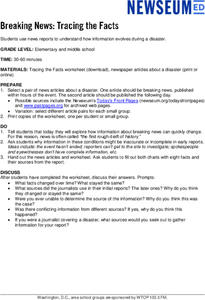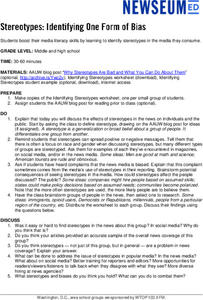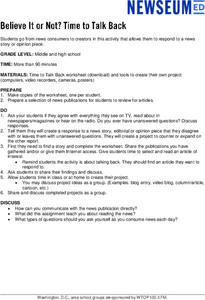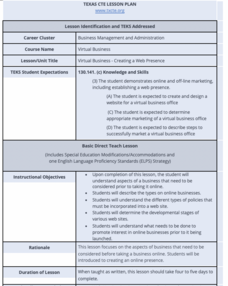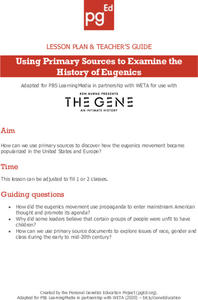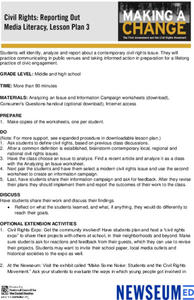Newseum
Civil Rights: Turning Points
As part of a civil rights movement study, groups select an event from an interactive timeline that they feel marks a turning point in the struggle. After collecting evidence to support their choice, the teams develop a multimedia...
Newseum
Free Press Challenges Through History: Analyzing Historical Sources
The debate over the integrity of stories in media is not new. Young journalists analyze historical sources that reveal freedom of the press controversies and draw parallels to challenges freedom of the press faces today.
Newseum
Persuasion Portfolios
After class members brainstorm a list of current social and political issues, groups each select a different topic from the list to research. Teams create a portfolio of at least 10 examples of stories about their issue, stories that...
Newseum
Breaking News: Tracing the Facts
Breaking news reports can be short of facts. Young journalists select a pair of news articles about a disaster; one published within hours of the event and the second published the following day. They examine whether facts in the report...
Newseum
Before and After: Analyzing Turning Points in History
Scholars examine front-page news stories to gather evidence about significant historical events. They hypothesize how these events changed people's lives who lived through them and how they continue to impact lives today.
Newseum
The Women Who Made the Movement
Granting women the right to vote was a long time coming and took many efforts. Young historians select one woman involved in the suffrage movement to research. They compare and contrast the depictions of their subject in mainstream and...
Newseum
News About My Community
After researching statistics about their community in local census reports, young journalists interview a resident about their interests and then analyze a local newspaper or homepage to see how similar the stories are to the residents'...
Newseum
The First Amendment in Action Today
Young activists research a community issue and apply the rights defined in the First Amendment to develop a proposal that would solve the issue—using Pinterest's board "The Freedom to Make A Change Posters" as examples, groups design a...
Newseum
Is This Story Share-Worthy?
Young journalists use a "Is This Story Share-Worthy?" flowchart graphic to decide whether a story is worth sharing online. Instructors provide groups with fake news, poor quality stories, opinion pieces, biased news, and high-quality...
Newseum
You Can't Say That in School? The Case of Lee v. Weisman
The Supreme Court case Lee v. Weisman is the focus of a instructional activity that examines religion in public schools. After reading a summary of the case and before reading the verdict, pupils use their knowledge of the First...
Newseum
Confronting Conformation Bias
Be curious! Seek out different opinions! Be conscious of your thinking process! After reading an article about confirmation bias and motivated reasoning, class members apply these strategies to the topic of school start times. They read...
Newseum
Stereotypes: Identifying One Form of Bias
Class members brainstorm a list of people in the news (immigrants, millennials, etc.). Teams then select one to research. Using the provided worksheet and guided by a list of questions, the teams examine the stereotypes in news reports...
Newseum
Believe It or Not? Time to Talk Back
Young journalists select a news story, editorial, or opinion piece that they disagree with or one that leaves them with questions. They then create their report in response and share it with the class.
Newseum
Am I Being Fair?
Young journalists use four strategies from an "Am I Being Fair?" tip sheet to check for and counter personal biases about a topic. Scholars apply the strategies to an article about the best pizza as guided practice. Participants then...
Newseum
Weighing the Arguments
To understand how personal perspectives can affect policy and politics, scholars examine the woman suffrage media map and historical artifacts to analyze arguments for and against women's suffrage. Class members then take on the role of...
Newseum
Things Change, Things Stay the Same
Securing women the right to vote was a long time coming. Over the years, some aspects of the suffrage movement changed, and some things remained the same. Pupils research three time periods and collect evidence of key people, strategies,...
Texas Education Agency (TEA)
Virtual Business - Creating a Web Presence
Using a helpful resource, scholars conduct research to learn about different types and aspects of virtual businesses. They research three company websites, taking notes on what they find appealing about the website design of each.
Bonneville
Learning About Solar Updraft Towers
Give it up for updraft towers. Pupils learn about solar updraft towers by first watching a video. They then research these structures on their own and think about how the toys they made in the previous lesson use the same scientific...
Bonneville
Informative Writing: Where Does Energy Come From?
Get energized about all the different sources of energy. A research project has scholars investigate a renewable or non-renewable energy type of their choice. They write a report on their findings and decide on a way to publish their work.
Personal Genetics Education Project
Using Primary Sources to Examine the History of Eugenics
Eugenics philosophy takes survival of the fittest to a whole new level. With a research-focused lesson, young scientists examine the history of the eugenics movement and its impact on society. Pupils engage with a video clip, primary...
Newseum
Civil Rights: Reporting Out
After brainstorming a list of contemporary local, regional, and national civil rights issues, pairs of scholars select one of these issues and design an information campaign to spread awareness of the issue.
Newseum
Search Signals: Understanding Your Top Hits
Class members watch a short video about the criteria used to drive search results to learn about how search engines work. Scholars use a "Search Signals" worksheet and a tip sheet to record information as they conduct a simple search of...
Newseum
Covering a Catastrophe: Evaluating Disaster News
Young journalists investigate the various ways to share news about a disaster and evaluate the pros and cons of each of these types of news. Individuals then select two different forms of media reports of a recent disaster. Using the...
Newseum
Journalists Code of Ethics
Journalists are supposed to adhere to a Code of Ethics. To determine the degree to which reporters follow this code, individuals select three recent stories with photographs from newspapers, magazines, online news sites, or television...





